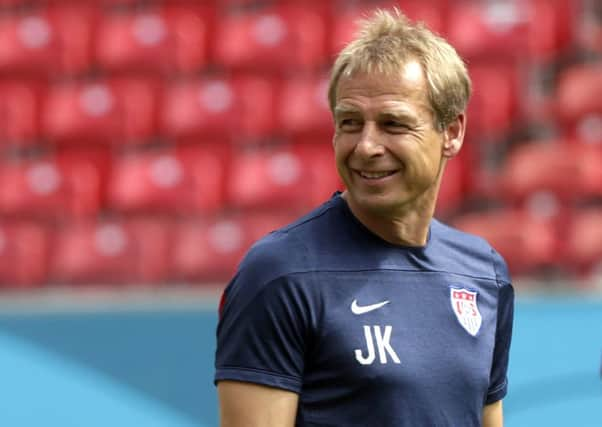Leon Wobschall: Klinsmann fits bill to restore England's fortunes


In this case, not a reference to the censorious words uttered late on Monday by an aghast nation after England’s rotten Euro 2016 exit to the deserving Icelandics.
But sentiments made in Germany, of all places, 12 years ago after Die Mannschaft headed back to the country with the equivalent of their tails between their legs after a disastrous 2004 campaign which was every bit as wretched as England’s feeble 2016 offering.
Advertisement
Hide AdAdvertisement
Hide AdIt was then that Jurgen Klinsmann, the son of a baker from the southern German town of Goppingen, got to work.
If Klinsmann is again entrusted with the task of transforming another big footballing nation, then anything resembling a replication of his work at the DFB would bring a few smiles back.
The current USA manager has leapt towards the top of the betting to replace England’s Roy Hodgson after his exit, with endorsements arriving from footballing luminaries, including Jamie Carragher.
It is easy to see why in a field which, with the greatest respect to the list of candidates, is not exactly overwhelming.
Advertisement
Hide AdAdvertisement
Hide AdIt is a list as noteworthy for the names not under serious consideration, rather than on it. No Mourinho, Conte, Guardiola, Pochettino, Bilic; they are all busy...
As for the mantra from many that England must be managed by an Englishman, many would venture that the last two from these isles who have turned their hand to the role in Hodgson and Steve McClaren have not exactly provided a ringing endorsement.
Granted, Klinsmann may be from the continent but he is an Anglophile and popular from his time at Spurs. Not that popularity should ever come into it.
It is a combination of other key drivers – experience, age, charisma and footballing cv – that make him a stand-out candidate.
Advertisement
Hide AdAdvertisement
Hide AdAlllied to that, by all accounts, is the 51-year-old’s enthusiasm for a role which he described as ‘intriguing’ this week.
In terms of his accomplishments, his sterling work in his two-year spell with Germany from 2004 to 2006, where he was assisted by current manager Joachim Low, rates at the top, yet his time with the USA should not be under-estimated either.
For England now, read Germany 12 years ago at Euro 2004. That the Germans suffered the ignominy of being knocked out of the European Championships at the group stages for the second successive tournament was bad enough – Rudi Voller’s side did not win any of their three matches, including one against Latvia.
But the more damning fact was that the side had no identity, no plan. Not very German, that.
Advertisement
Hide AdAdvertisement
Hide AdKlinsmann displayed vigour and aptitude to turn Germany into a stylish side based on vibrant, fast-paced attack. It may not have yielded a trophy in their home World Cup in 2006, but saw them lift a nation and win many friends en route to a third-placed finish when many Germans feared humiliation on home soil.
If you can successfully pilot the host nation at a World Cup, then you must be onto something.
The likes of Miroslav Klose, Lukas Podolski, Phillip Lahm and Bastian Schweinsteiger came to the fore for a journey which ended in World Cup glory in 2014; with Low carrying on Klinsmann’s traits of high-octane football.
It was Klinsmann who set the path for Germany to truly rediscover their footballing DNA. The FA may have trumpeted and marketed England’s ‘DNA’ in the corridors of power, but given recent events, it is a meaningless and glib slogan. We do not have any.
Advertisement
Hide AdAdvertisement
Hide AdIdentity was Klinsmann’s first port of call. He held meetings with players upon his arrival and asked them exactly what Germany’s footballing identity was.
After putting the ideas on a flip chart, he asked them what it really meant in practical terms. How do you play with “aggression”. How do you play “fast” football or “proactive” football in reality?
The upshot was that Germany honed an identifiable attacking style based upon closing down opponents and expansively opening up the pitch when in possession with passing football.
It took time and some defeats, but Germany got there in end. Of course, playing talent helps. But while England’s under-performance in Euro 2016 was shocking, do not let it be said there is no talent base to work with.
Advertisement
Hide AdAdvertisement
Hide AdNo-one can say that the likes of Delle Ali, John Stones, Eric Dier, Danny Rose and Raheem Sterling will not offer something under a coherent style of fast-paced football.
Such young players need leadership, not muddled thinking. They were crying out for that sort of direction in France, but did not get any.
Maybe that is where Herr Klinsmann might just come in – a German providing a clear English vision.